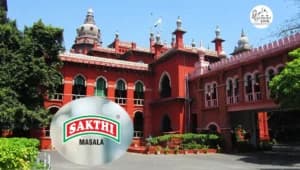The Supreme Court of India has set aside the prosecution initiated against Vijay Krishnaswami (also known as Krishnaswami Vijayakumar) in a case related to alleged tax evasion for the assessment year 2017–2018. The court ruled that continuing the prosecution despite the Settlement Commission’s order granting immunity from penalty was a violation of binding guidelines and amounted to abuse of the legal process.
Case Background
The case began with an income tax search on April 24, 2016, at the residence of the appellant, during which authorities seized unaccounted cash worth ₹4.93 crore. A complaint was later filed under Section 276C(1) of the Income Tax Act, which deals with wilful attempts to evade tax.
In 2018, Krishnaswami approached the Madras High Court seeking to quash the prosecution, but the petition was dismissed. Meanwhile, he also filed an application before the Settlement Commission in December 2018, voluntarily disclosing additional income and seeking immunity. On November 26, 2019, the Settlement Commission granted immunity from penalty but refrained from granting immunity from prosecution since the quash petition was still pending before the High Court.
Despite this, the prosecution continued before the trial court in Chennai.
Senior counsel for the appellant argued that:
- The Settlement Commission’s order under Section 245D(4) is binding and conclusive under Section 245-I of the Income Tax Act.
- As per CBDT’s 2008 and 2019 circulars, prosecution under Section 276C(1) should only be launched after confirmation of penalty by the Income Tax Appellate Tribunal (ITAT).
- Since the undisclosed income assessed was less than ₹25 lakhs in tax liability, prosecution could not proceed without special approval.
- Continuing prosecution after immunity from penalty amounted to “gross abuse of process of law.”
Read Also:- Madras High Court Denies Wife Interim Maintenance, Orders Support Only for Son
On the other hand, the Revenue contended that since the prosecution complaint was filed before the settlement application, the assessee could not be granted immunity from prosecution under Section 245H(1). It was argued that unaccounted cash not disclosed in the return clearly amounted to wilful tax evasion.
The Bench of Justice J.K. Maheshwari and Justice Vijay Bishnoi examined the provisions of the Income Tax Act, departmental circulars, and past precedents.
The Court highlighted:
- Section 276C(1) punishes a wilful attempt to evade tax, but “actual evasion” must be proven with mens rea.
- CBDT circulars (2008, Prosecution Manual 2009, and 2019 clarification) require penalty confirmation by ITAT before prosecution. These are binding on authorities.
- The Settlement Commission found no suppression of material facts and granted immunity from penalty.
- The Revenue acted in “blatant disregard of their own binding circulars” and persisted with prosecution without legal basis.
Read Also:- Madras High Court Allows Vinayagar Chaturthi Celebrations with Strict Eco-Friendly Guidelines
Quoting the court:
“Such willful non-compliance of their own directives reflects a serious lapse, and undermines the principles of fairness, consistency, and accountability.”
The Supreme Court quashed the prosecution against Vijay Krishnaswami and imposed ₹2,00,000 costs on the Revenue, payable to the appellant.
The judgment makes it clear that authorities must strictly follow CBDT guidelines and respect orders of the Settlement Commission. Continuing prosecutions contrary to binding instructions amounts to misuse of legal process.
Case: Vijay Krishnaswami @ Krishnaswami Vijayakumar vs. The Deputy Director of Income Tax (Investigation)
Case Type: Criminal Appeal (arising out of SLP (Crl.) Nos. 3618–3620 of 2024)
Appellant: Vijay Krishnaswami @ Krishnaswami Vijayakumar
Respondent: Deputy Director of Income Tax (Investigation), Chennai















